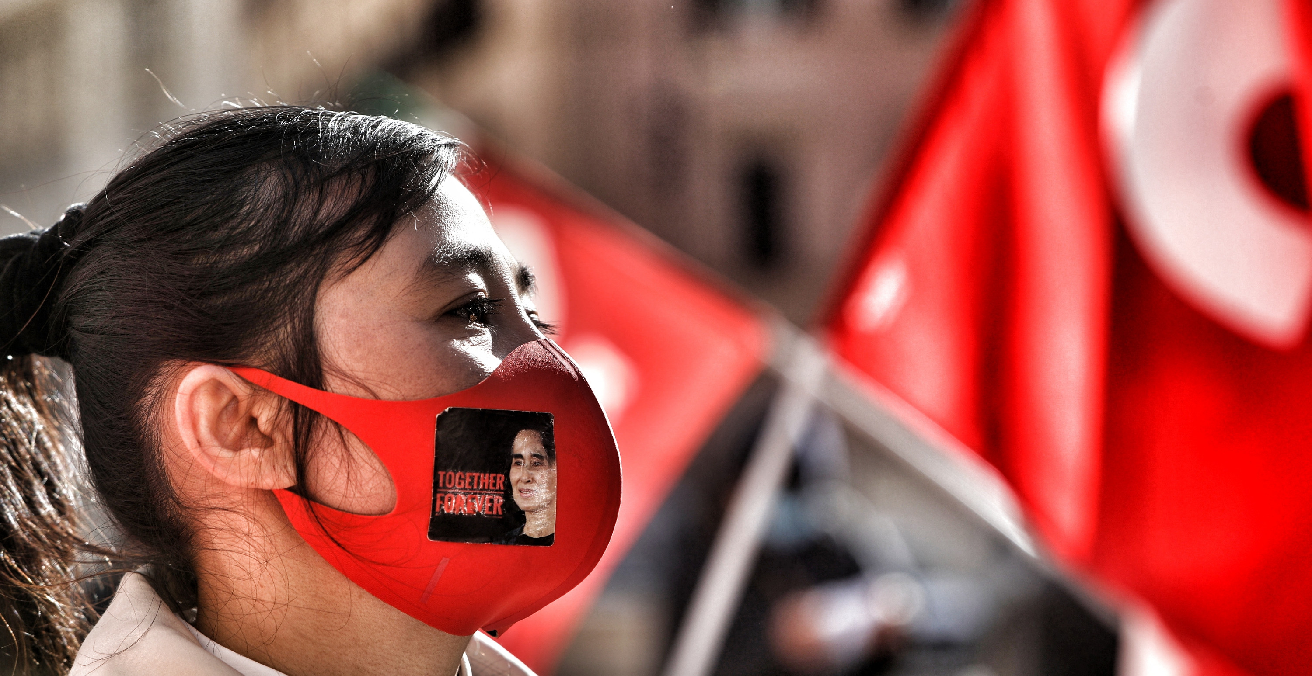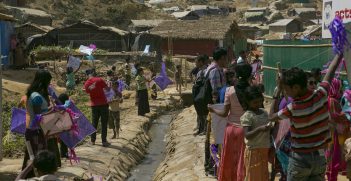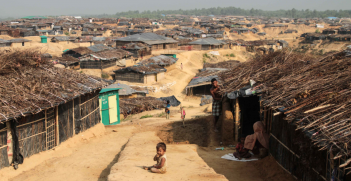How is Myanmar’s Military Coup Revealing the Youth’s Changing Political Culture?

It’s now been more than two weeks since General Min Aung Hlaing instigated the military coup in Myanmar. At the vanguard of the evolving “social opposition” is Generation Z.
The coup was ostensibly aimed at addressing electoral fraud and protecting democracy, but it was likely more of a shameless (and personal) grab for power. The coup has swiftly triggered powerful protests and a resistance movement of national proportions that form a significant “social opposition” to the military take-over. With support from their elders and professional groups, the “Gen Zers,” young people aged between 16 and 30, are involved in a myriad of creative and peaceful actions around the country, demonstrating people power, expressing their dissent, and raising awareness of their plight.
The way this young generation is leading the nonviolent protests and resistance artistically, symbolically, and with creative and catchy slogans reveals how the political culture amongst the youth in Myanmar has changed over the last ten years of political transition. And with this changing political culture of youth, the military is being pressured to rethink its strategies to rule the country.
Myanmar’s Generation Z in the age of internet and globalisation
Generation Z are the first “digital” generation, exposed from early youth to the internet, social media, and mobile phone systems. Because Gen Zers are generally skilled and confident in virtual and offline experiences, around the world they are at the forefront of digital and online activism against authoritarian systems, governments, and regimes.
With the rapid expansion of telecommunications in Myanmar, social and political actions and interactions are considerably dominated by the internet. Today, around 90 percent of Myanmar’s people have access to a phone with internet connectivity, and nearly 22 million people use Facebook for social networking and access to information. The access to mobile phones and internet have not only made Myanmar’s youth digitally savvy and active, but also well connected to their counterparts in the ASEAN region and beyond.
Gen Zers in Myanmar have matured in a freer, more democratic society, and have had access to opportunities that previous generations never had. Those who have resources and capabilities reaped the benefits of globalisation by travelling abroad for study, migration, and employment. A sizable number of urban and rural middle-class youth had the opportunity to participate in the “development industry” and “market growth” that have remarkably boomed in Myanmar following the 2011 political transition.
About 55 percent of Myanmar’s 54 million people are under the age of 30. In the general election held in November 2020, five million Gen Zers were first-time voters. They went to the polls in which Aung San Suu Kyi’s National League for Democracy (NLD) won a landslide victory.
In a personal communication with one of the authors, a young environmentalist explained how Myanmar’s young generation is aspiring to change:
In recent years, although we did not have full democracy, the youth have [had] more right to speak and opportunity to connect to the rest of the world – they believe today’s world is different from over 30 years ago.
Myanmar’s Generation Z is by no means a homogenous entity, however. Urban-rural and ethnic divides are noticeable, as urban-based Gen Zers, who mostly come from a Bamar/Buddhist-majority background, generally do not speak for the youth in rural or ethnic areas. A strength for Generation Z’s social opposition is the strong presence of youth-led organisations and networks, working in a variety of social justice fields, throughout the country. But given Myanmar’s enduring ethnic and social fragmentation triggering several identity crises, Bamar and ethnic youth will need to unite against the dictatorship.
Youth, political culture, and the art of political protests
Political culture is a dynamic phenomenon that can change when people’s attitudes, beliefs, ideas, and sentiments towards political processes and institutions shift. Globalisation, capitalism, transnationalism, and communication are some of the factors that powerfully re-shape and shift political cultures around the world. There has been a drastic shift towards politics in Myanmar over the last ten years, where aspiration for greater political freedom and the rejection of military rule was expressed in the massive support of the NLD in the 2015 and 2020 elections.
The youth have been at the forefront of opposition to any type of injustice in Myanmar. Since the military coup, the Gen Zers have been working with, and utilising, some of the forms of protest from the student protesters of 1988 – the 88ers – many of whom are leaders and supporters of the NLD.
However, this social opposition in 2021 differs in a number of ways. Young people seem self-organised, using social media and the internet as mobilising tools to organise what looks like an emerging “leaderless social movement.” Although many are protesting under the colours and symbols of the NLD, or were initially marching for the NLD, a larger, anti-coup struggle is slowly emerging. The protest is more than politics. Indeed, it is about freedom and democracy, and the future of young people at large. Thus, young people are forming “social opposition” rather than “political opposition” to the coup.
This social opposition signifies the changing political culture amongst the youth, representing diffuse political, cultural, and socioeconomic interests, and is independent of any single political force or politician. Although young protesters are sympathetic to Suu Kyi and other NLD leaders currently under a detention, they are protesting for a “cause,” not “leaders.” By operating outside of a single political force, the Gen Zers are putting the military generals under extreme pressure.
New slogans a symbol of changing political culture
It is also fascinating to observe how the youth generation are using new protest slogans that identify them with Western political culture. Some of the slogans, such as “my ex is bad, but the military is worse” and “I want a relationship NOT a dictatorship,” speak about “personal matters” that would have been considered culturally inappropriate in Myanmar’s society until the recent past. These slogans indicate an emerging individualism and point to an evolving “open society” influenced by Western political and protest cultures. One slogan that reads “My dreams are higher than MAL’s [Ming Aung Hlaing – the army chief] height” shows how the young generation has personalised the coup to the army chief’s ambition.
The utilisation of Western-informed memes and slogans highlight that Myanmar is at the crossroads of modernity and traditionalism. The coup designers favour traditionalism and the status quo and are working towards maintaining social control through force. In contrast, Generation Z is reacting creatively, reflecting Myanmar’s recent experiment with modernity and openness.
To what extent the changing political culture of the youth and the “social opposition” to the coup will pressurise the military rulers to return to democracy is yet to be seen. The effectiveness of the social opposition, in part, also depends on the solidarity between the youth belonging to ethnic minorities and the Bamar/Buddhist majority.
Experience shows that suppression of voices through violence stimulates transnational linkages of protests and activism, enabling activists’ access to NGOs, aid agencies, and human rights groups abroad. More violent and coercive social control by the military exposes their wrongdoings to the world and enables the protesters to gain bigger international solidarity. Less coercive control means that social opposition will evolve more powerfully. In this situation, perhaps the military will co-opt ethnic leaders, ethnic armed groups, and youth leaders to avert what is likely to develop into a long-term reformative social movement.
The military might choose to silence the people for some time, but reversing the young generation’s changing political culture will be much more difficult.
Dr DB Subedi is a postdoctoral research fellow in Sociology and Peace Studies in the School of Humanities, Arts, and Social Sciences at the University of New England in Australia. His current research examines the rise of nationalism, populism, and religious extremism in South Asia including Myanmar.
Dr Johanna Garnett is a lecturer in Sociology and Peace Studies in the School of Humanities, Arts, and Social Sciences at the University of New England in Australia. Her research focuses on social movements, alternative development, political and environmental activism, youth and community development, Myanmar and globalisation.
This article is published under a Creative Commons License and may be republished with attribution.





